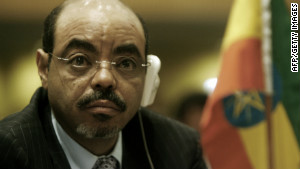 Ethiopian Prime Minister Meles Zenawi, a
strongman in the troubled Horn of Africa and a key United States ally,
has died, his government announced Tuesday.
Ethiopian Prime Minister Meles Zenawi, a
strongman in the troubled Horn of Africa and a key United States ally,
has died, his government announced Tuesday.
Meles had not been seen in public in months, sparking intense international speculation about his health.
The government revealed neither the cause nor the location of his death Monday at the age of 57.
Meles came to the
forefront as a leader of a guerrilla insurgency against dictator Haile
Mengistu Mariam in 1991 and cemented power in the ensuing decades.
Ethiopian PM dies at 57
Seen by admirers as a
force for stability in a region with Islamist insurgencies in Somalia
and Yemen and a history of famine, he was also criticized for cracking
down on political opposition and the press.
"He came to power at the
barrel of a gun, but he made the transition from rebel leader to
political leader very quickly," said Ayo Johnson, a writer on Africa and
director of Viewpoint Africa.
But he never overcame his "mindset as a rebel leader," and his democratic credentials were "poor," Johnson said.
"The West turned a blind eye to many aspects of his game that were not up to scratch," he added.
That's partly because of
his action against Islamist movements in the region, including an
invasion of Somalia in 1998, Johnson said.
"He supported everything
that the United States wanted to do against terror," he explained, such
as give American drones based in the region permission to use Ethiopian
airspace on their way to targets in Somalia.
And "he was able to address the fundamentals -- health care, education, reducing the poverty rate," Johnson said.
U.S. President Barack
Obama praised Meles' "unyielding commitment to Ethiopia's poor" in a
statement Tuesday, citing his "personal admiration for (Meles') desire
to lift millions of Ethiopians out of poverty through his drive for food
security."
But in June, U.S. Sen.
Patrick Leahy, a Vermont Democrat, highlighted a different aspect of
Meles' rule -- the case of journalist Eskinder Nega, who was then before
a court in Addis Ababa.
While praising the prime
minister's work in "containing the real threat of terrorism in the
region and making gains against the region's recurring famines," Leahy
accused him of "trying to silence those who do not toe the official
line."
His Ethiopian People's
Revolutionary Democratic Front took all but one seat in parliament in
elections in 2010, Africa expert Jason Mosley pointed out in the wake of
Meles' death.
"Nearly 200 people were
reportedly killed, and tens of thousands detained" in the previous
elections in 2005, said Mosley, who is with the Chatham House think tank
in London.
Last year, Ethiopia found two Swedish journalists guilty of supporting terrorism and sentenced them to 11 years in prison.
Meles died at 11:40 p.m.
Monday from an unspecified infection, spokesman Bereket Simon said.
Deputy Prime Minister Hailemariam Desalegn is now in charge.
There will be no elections before the next scheduled ballot in 2015, Bereket said.
Meles had been scheduled
to step down in 2013 as part of a transition process, Mosley said, but
questioned whether he genuinely intended to relinquish power.
Meles was out of the
country when he died and members of his family were with him, according
to Bereket. He did not say what country Meles' body was in or when it
would return to Ethiopia, except that it would be soon.
The spokesman acknowledged the prime minister had been sick for some time but didn't immediately seek treatment.
The news came almost a week after the government said Meles was "recovering well" after treatment for an unspecified illness.
Bloggers launched a
counter of the number of days he's been missing, while citizens took to
social media to discuss his whereabouts and exchange conspiracy
theories.
The secretive nation had
released little information about his whereabouts, prompting rumors and
opposition claims that he was dead or facing a life-threatening
illness.
The government held a news conference last month and announced Meles received treatment for an unspecified illness.
His absence was more
evident last month when Ethiopia hosted an African Union summit in its
capital of Addis Ababa. Meles, a key player in talks on the tensions
between Sudan and its rival neighbor South Sudan, did not attend.
Former U.N.
Secretary-General Kofi Annan said Ethiopia under Meles had "played a key
role in both the region and the African continent."
"I hope that his
successor will continue to be a driving force on a wide range of issues,
from brokering peace negotiations to shaping development
relationships," Annan said.
Ethiopia, a key Western
ally often lauded for effective use of aid money, is surrounded by
unstable nations such as Somalia and Sudan. Meles has been credited with
working toward peace and security in the region, and the Ethiopian army
sent peacekeepers to battle the Islamic extremist group Al-Shabaab in
Somalia.

















0 comments:
Post a Comment